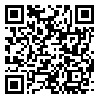Volume 3, Issue 10 (8-2009)
Research on Addiction 2009, 3(10): 77-96 |
Back to browse issues page
Download citation:
BibTeX | RIS | EndNote | Medlars | ProCite | Reference Manager | RefWorks
Send citation to:



BibTeX | RIS | EndNote | Medlars | ProCite | Reference Manager | RefWorks
Send citation to:
Barati M, Allahverdipour H O, Moinei B, Farhadinasab A, Mahjub H, Jalilian F. Application of the Theory of Reason Action for Preventing of Ecstasy Abuse among College Students. Research on Addiction 2009; 3 (10) :77-96
URL: http://etiadpajohi.ir/article-1-429-en.html
URL: http://etiadpajohi.ir/article-1-429-en.html
Majid Barati * 
 , Hamid ollah Allahverdipour
, Hamid ollah Allahverdipour 
 , Babak Moinei
, Babak Moinei 
 , Abdollah Farhadinasab
, Abdollah Farhadinasab 
 , Hosin Mahjub
, Hosin Mahjub 
 , Farzad Jalilian
, Farzad Jalilian 


 , Hamid ollah Allahverdipour
, Hamid ollah Allahverdipour 
 , Babak Moinei
, Babak Moinei 
 , Abdollah Farhadinasab
, Abdollah Farhadinasab 
 , Hosin Mahjub
, Hosin Mahjub 
 , Farzad Jalilian
, Farzad Jalilian 

Hamadan University of Medical Sciences
Abstract: (15542 Views)
Introduction: The aim of the present study was assessed the effect of educational program for preventing of ecstasy abuse among college students in Hamadan based on Theory of Reason Action (TRA). Method: A quasi-experimental study carried out in college students. A total number of 140 students were selected through randomized cluster sampling and randomly assigned to the intervention (n=70) and the control (n=70) groups. Data-gathering tools consisted of a two-part questionnaire: Knowledge of ecstasy abuse consequences and one scale for measuring TRA variables. Respondents in the control and experimental groups completed questionnaires at before and two months after intervention. Results: The results showed that among constructs of the theory of reason action, subjective norms were better predictor of ecstasy abuse. There were significant differences between the scores of reason action constructs namely: attitude against drug abuse, subjective norms and intention of ecstasy abuse with consideration of group (witness and experimental). Conclusion: With regard to the results of the current study, special education based on Theory of Reasoned Action is effective in improving of attitude, subjective norm and behavioral intention of students. Therefore it is highly recommended that TRA education can be use for preventing of drug abuse education programs.
Type of Study: Research |
Subject:
General
Received: 2014/06/3 | Accepted: 2014/06/3 | Published: 2014/06/3
Received: 2014/06/3 | Accepted: 2014/06/3 | Published: 2014/06/3
| Rights and permissions | |
 |
This work is licensed under a Creative Commons Attribution-NonCommercial 4.0 International License. |



